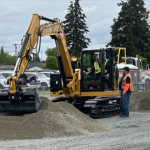Building a better you: Self-care tips for construction workers
Construction workers are the unsung heroes of our modern world, building the structures that shape our communities. However, the physical and mental demands of this profession can take a toll on their well-being. After a long day of physical labor, it’s crucial for construction workers to prioritize self-care to ensure their health and longevity. In this blog, we’ll discuss some practical tips on how construction workers can take care of themselves both physically and mentally.
mental demands of this profession can take a toll on their well-being. After a long day of physical labor, it’s crucial for construction workers to prioritize self-care to ensure their health and longevity. In this blog, we’ll discuss some practical tips on how construction workers can take care of themselves both physically and mentally.
Physical self-care
Hydration: Staying hydrated is paramount for construction workers. Dehydration can lead to fatigue, muscle cramps, and reduced cognitive function. Always carry a reusable water bottle and make it a habit to drink water throughout the day. In hot weather, increase your fluid intake to compensate for sweating.
Proper nutrition: Eating a balanced diet fuels your body and helps you recover after a physically demanding day. Prioritize meals with a mix of lean proteins, complex carbohydrates, and vegetables. Avoid excessive caffeine and sugary drinks, as they can lead to energy crashes.
Stretching and warm-up: Before starting work, engage in stretching exercises to warm up your muscles and improve flexibility. This can help reduce the risk of injury and alleviate muscle soreness after a long day on the job.
Ergonomic tools and equipment: Ensure that the tools and equipment you use are ergonomically designed to reduce strain on your body. Properly adjusted equipment can significantly reduce the risk of musculoskeletal injuries.
Rest and sleep: Adequate rest is essential for recovery. Aim for 7-9 hours of quality sleep each night. Create a sleep-conducive environment by keeping your bedroom dark, quiet, and cool. A well-rested body is better equipped to handle the physical demands of construction work.
Mental self-care
Stress management: Construction work can be mentally taxing, with tight deadlines and high-pressure situations. Find healthy ways to manage stress, such as deep breathing exercises, meditation, or mindfulness practices. Taking short breaks during the day to clear your mind can also be beneficial.
Peer support: Building strong relationships with your colleagues can provide a valuable support system. Share your experiences, challenges, and successes with your coworkers. Knowing you have a network of people who understand your profession can be immensely comforting.
Set realistic goals: Set achievable goals for each day and prioritize tasks. Break down larger projects into smaller, manageable steps. This can help prevent feeling overwhelmed and boost your sense of accomplishment.
Time management: Effective time management can reduce stress and improve work-life balance. Create a schedule that allows for regular breaks and leisure time. Make sure to leave work at work and disconnect from job-related stressors when you’re off the clock.
Seek professional help: If you’re struggling with mental health issues, don’t hesitate to seek professional help. Mental health is just as important as physical health. A therapist or counselor can provide guidance and support to help you navigate challenges.
Construction workers play a crucial role in building the world we live in. To continue doing their jobs effectively and maintain their overall well-being, they must prioritize self-care. Physical self-care, including hydration, nutrition, proper warm-up, ergonomic practices, and adequate rest, is essential for maintaining physical health.
Mental self-care, focusing on stress management, peer support, goal-setting, time management, and seeking professional help when needed, is equally crucial. By combining these strategies, construction workers can build a stronger, healthier foundation for themselves and their careers. Remember, taking care of yourself is not a sign of weakness but a testament to your dedication to your profession and your own well-being.








